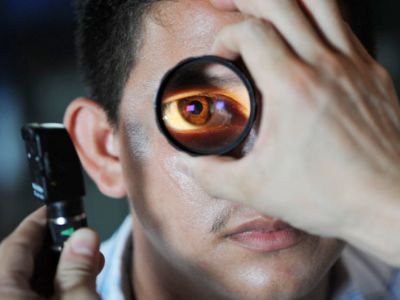
Presbyopia is when your eyes gradually lose the ability to see things clearly up close. It is a normal part of aging. You may start to notice presbyopia shortly after age 40. You will probably find that you hold reading materials farther away to see them clearly.
Your clear lens sits inside the eye behind your colored iris. It changes shape to focus light onto the retina so you can see. When you are young, the lens is soft and flexible, easily changing shape. As a result, it is more difficult to read, thread a needle, or do other tasks that require close-up vision.
There is no way to stop or reverse the normal aging process that causes presbyopia. However, presbyopia can be corrected with eyeglasses, contact lenses, or surgery. A progressive lens may be helpful for those who struggle to see close and far. Presbyopia may cause eye strain and headaches if left uncorrected.

Symptoms of Presbyopia
- A tendency to hold reading material farther away to make the letters clearer
- Blurred vision at normal reading distance
- Eyestrain or headaches after reading or doing close-up work
Seek immediate help or go to the nearest medical facility if you:
- Have a sudden loss of vision in one eye with or without eye pain
- Experience sudden hazy or blurred vision
- See flashes of light, black spots, or halos around lights
- Have double vision
What Causes Presbyopia?
Presbyopia is caused by a hardening of the lens of your eye, which occurs with aging. As your lens becomes less flexible, it can no longer change shape to focus on close-up images. As a result, these images appear out of focus.
How Common is Presbyopia?
Presbyopia is known to develop with age and typically starts to develop in adults at around 40 years of age. It affects people in both developed and developing countries. People aged 45 years and older in the United States are more likely to suffer from presbyopia than people of other ages. A study of adults aged 45 and above found that 76% of those in developing countries have presbyopia.
What are the Risk Factors of Presbyopia?

- Age. Age is the greatest risk factor for presbyopia. Presbyopia occurs in almost everyone after age 40.
- Other medical conditions. Premature presbyopia is presbyopia in people under 40 who are farsighted or have diseases like multiple sclerosis or cardiovascular disease.
- Drugs. Drugs such as antidepressants, antihistamines, and diuretics are associated with premature presbyopia.
How to Diagnose Presbyopia?
Presbyopia is diagnosed through a basic eye exam. It includes a refraction assessment and an eye health exam. Refraction tests determine whether a person is nearsighted, farsighted, astigmatic, or presbyopic.
Treatment for Presbyopia
The goal of treatment is to compensate for the inability of your eyes to focus on nearby objects. Your doctor may recommend using eyeglasses or contact lenses. Refractive surgery, lens implants, and corneal inlays are also helpful but may be expensive. Eye care products may also alleviate symptoms, you can use any of the following:









